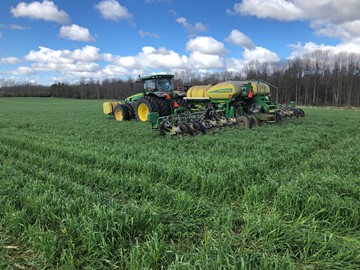
Planting 100% cover crops is not just the goal but the reality for Deer Run Dairy. Duane Ducat and his partners, Derek Ducat, who is his son, and Dale Bogart have experienced the many benefits from conservation practices that they use on all acres.
 |
Ducats started farming in 1968 with 35 cows and 150 acres but, like many Wisconsin farms, have evolved over the years. The co-owners now milk 1,600 cows and farm 2,500 acres. In the 1980s, the farm was an early adopter of no-till planting. Ducat realized the benefits of not tilling the land and since then has practiced no-till planting whenever practical. As the farm grew, the partners introduced more practices that allowed them to tailor their use of the nutrients from cow manure and keep the soil healthy.
In 2016, a neighboring farm began talking about a farmer-led conservation group in southern Wisconsin and gathered a group of 14 farmers in southern Door and Kewanee counties who all had an interest in improving water quality and soil health. This group eventually formed Peninsula Pride Farms (PPF), a farmer-led group that has since grown to 54 members.
“The best thing we did was acknowledge that there was a problem, and we were part of it; but also, that we wanted to be part of the solution,” Ducat said. “Having a thriving ag community and clean water is something a farmer needs, as well as its local community. We needed to figure out where the problem was coming from and how to correct it.”
Deer Run Dairy proudly plants 100% cover crops ― mostly rye, some triple blends, turnips, tillage radishes and barley. The farm also uses different practices such as no-tillage, planting green into a living crop, reducing herbicide use and interseeding a cover crop into a corn crop. Not only are these practices helping the soil and in turn water quality, but they also help keep nutrients where the crops can access them. The practices are also saving time and money.
 |
Derek Ducat joined his father in farming after attending the Farm & Industry Short Course at the University of Wisconsin-Madison and came back to the farm with many ideas. He agreed it takes time to incorporate all aspects of farming into practicing conservation, but groups like PPF and Door-Kewaunee Demo Farms have helped the farm with ideas, confidence and a greater chance for success by working with individuals who can share tips.
“We have always prioritized conservation and keeping soil in place,” he said. “Unfortunately, a lot of damage and losses can happen fast. For the future of ag and my kids, we support more farms using conservation practices for better soil so they have a chance to continue farming.”
PPF continues to grow across Kewaunee and southern Door counties. The group represents 97,169 acres and 93,777 dairy animals, beef cattle and pigs. The group collaborates with university researchers, environmental groups and community leaders to implement innovative farming practices that protect and improve ground and surface water in a geologically sensitive part of the state.
Many of Ducat’s fellow farmers are incorporating nontraditional conservation practices as well. Last year, for example, PPF members planted 28,805 acres in cover crops, used low-disturbance manure application on 6,363 acres and reduced soil tillage on 37,429 acres. Members also use soil sampling and nutrient management plans. Overall, the group has seen a 22% increase in the number of acres with conservation practices from the previous year.
Data is showing that these practices are significantly reducing the chance of harmful runoff into streams and lakes. The farmers in 2021 potentially prevented an estimated 101,878 pounds of phosphorus from leaving the fields and reduced 42,020 tons of sediment erosion along with reducing carbon dioxide equivalents by 12,093 tons, according to an analysis shared by the state Department of Agriculture, Trade and Consumer Protection; the University of Wisconsin-Madison; and The Nature Conservancy (TNC). For comparison, 100 tons of sediment is about 10 standard dump truck loads, and 1 pound of phosphorous in a lake or stream has the potential to cause the growth of up to 500 pounds of algae, which can degrade water quality. The amount of greenhouse gas emissions reduced equals 2,606 cars driven for a year.
The modeling-based analysis calculated an estimate of the potential impact of cover crops, low-disturbance manure application and reduced tillage compared to more conventional methods typical to the group’s area.
 |
TNC is a key supporter of PPF and helps to complete the annual analysis, which is based on member surveys.
“Farmers in Peninsula Pride Farms are improving the soil health on over 90,000 acres of crop fields year after year,” Steve Richter, TNC’s director of agriculture strategies in Wisconsin, said. “Healthy soil provides important benefits to people and nature. From food production to filtering and storing water to reducing the impacts of climate change, soil is a critical natural resource.”
Duane Ducat said farmers have been “doing what they’ve always done” because that was the culture. Change can be difficult and does not come without risk. Farmers like Ducat are pushing for change in that culture by doing and sharing practices that are improving the environment.
“Through farmer-led watershed organizations and working with partners and agencies, we are really trying to improve the farming practices and best management practices to improve water quality and soil health. We need to keep learning from what we are doing now, and then do more to inform people to move forward,” he said.
BY THE NUMBERS
Number of acres covered by conservation practices among Peninsula Pride Farms members:
- 2016 ― 157,912
- 2020 ― 286,460
- 2021 ― 350,080
*Multiple conservation practices can be used on a farm field
Potential impact of conservation practices in 2021:
- Phosphorus runoff reduction ― 101,878 pounds
- Sediment erosion reduction ― 42,020 tons

